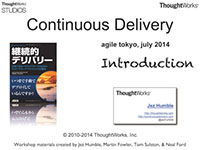Register to「Continuous Delivery」tutorial
Apply peropd from Jun 11th to July 17th 2014

Getting software released to users is often a painful, risky, and time-consuming process. This tutorial sets out the principles and technical practices that enable rapid, incremental delivery of high quality, valuable new functionality to users. Through automation of the build, deployment, and testing process, and improved collaboration between developers, testers and operations, delivery teams can get changes released in a matter of hours–sometimes even minutes–no matter what the size of a project or the complexity of its code base.
In this tutorial we analyze each stage of the delivery process from development through testing to release, discussing at each stage how to improve collaboration and increase feedback so as to make
the delivery process as fast and efficient as possible. At the heart of the tutorial is a pattern called the
deployment pipeline, which involves the creation of a living system that models your organization's
value stream for delivering software. We spend the first half of the tutorial introducing this pattern,
and discussing how to incrementally automate the build, test and deployment process, culminating in
continuous deployment.
In the second half of the tutorial, we introduce agile infrastructure, including the use of Puppet to automate the management of testing and production environments. We'll discuss automating data management, including migrations. Development practices that enable incremental development and
delivery will be covered at length, including a discussion of why branching is inimical to continuous
delivery, and how practices such as branch by abstraction and componentization provide superior
alternatives that enable large and distributed teams to deliver incrementally.
※There is no hands-on work, so no laptops are required for the tutorial.
※It aims to be valuable for everybody involved in software delivery, from testers and developers to managers and systems administrators.
(Contents of this brochure are to be changed without any advanced notice.)
Register to「Continuous Delivery」tutorial
Apply peropd from Jun 11th to July 17th 2014

Jez Humble is a principal at ThoughtWorks, a lecturer at UC Berkeley, and co-author of the Jolt Award winning Continuous Delivery, published in Martin Fowlerʼs Signature Series (Addison Wesley, 2010), and the forthcoming Lean Enterprise, in Eric Riesʼ Lean series. He has worked as a software developer, product manager, consultant and trainer across a wide variety of domains and technologies. His focus is on helping organisations deliver valuable, high-quality software frequently and reliably through implementing effective engineering practices.
Technologic Arts Incorporated
TEL: 03-5413-3788
FAX: 03-3470-3299
E-Mail: marketing@tech-arts.co.jp